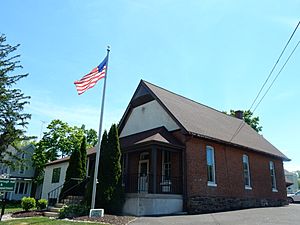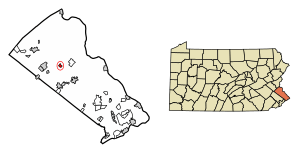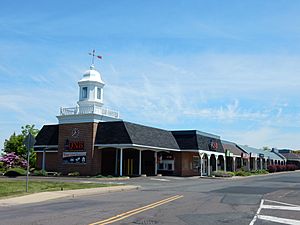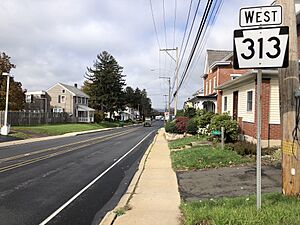Dublin, Pennsylvania facts for kids
Quick facts for kids
Dublin, Pennsylvania
|
||
|---|---|---|

Borough Hall
|
||
|
||

Location in Bucks County, Pennsylvania
|
||
| Country | United States | |
| State | Pennsylvania | |
| County | Bucks | |
| Government | ||
| • Body | Mayor, Council | |
| Area | ||
| • Total | 0.58 sq mi (1.51 km2) | |
| • Land | 0.58 sq mi (1.51 km2) | |
| • Water | 0.00 sq mi (0.00 km2) | |
| Elevation | 597 ft (182 m) | |
| Population
(2020)
|
||
| • Total | 2,177 | |
| • Density | 3,734.13/sq mi (1,442.08/km2) | |
| Time zone | UTC-5 (Eastern (EST)) | |
| • Summer (DST) | UTC-4 (EDT) | |
| ZIP Code |
18917
|
|
| Area codes | 215, 267 and 445 | |
| FIPS code | 42-20104 | |
Dublin is a small town, also called a borough, located in Bucks County, Pennsylvania, United States. In 2020, about 2,177 people lived there. Students in Dublin go to schools in the Pennridge School District.
Contents
Exploring Dublin's Location
Dublin is found at specific coordinates: 40°22′24″N 75°12′9″W / 40.37333°N 75.20250°W. This means it's located at 40.373270 degrees North and -75.202464 degrees West. According to the U.S. Census Bureau, the borough covers a total area of about 0.5 square miles (1.3 square kilometers), and all of it is land.
Dublin's Past: A Look at Its History
Before Europeans arrived, the area where Dublin now stands was home to the Lenape people. The first European settlers were mostly from Ireland, followed by German families.
How Dublin Got Its Name
There's a local story that the town's name came from "Double Inn." This is because a second tavern was supposedly built as a double log cabin. However, there's no official proof for this story. It's more likely that the name came from the city of Dublin in Ireland. The first time Dublin was mentioned in writing was in a letter from Reverend Uriah DuBois on April 21, 1798. In 1817, when a tavern and 76 acres of land were sold, the area was called "the village of Dublin."
Becoming a Borough
In 1832, local residents tried to make Dublin an official township, but their request was turned down. Another attempt in 1841, which included people from New Britain Township, also failed. Finally, Dublin officially became a borough in 1912.
Early Services and Businesses
Dublin's first post office opened on April 18, 1827, with Newton Rowland as the postmaster. Before that, mail came from Doylestown and Hilltown. William Rowland, who was from Dublin, served in the Pennsylvania General Assembly from 1812 to 1815. For many years, a store called J. D. Moyer & Co. was one of the biggest and most successful country stores in the area.
What Dublin is Like Today
Dublin stretches along Pennsylvania Route 313, which connects the larger towns of Doylestown and Quakertown. You can see almost the entire town from Route 313, with only a few streets branching off.
The town is surrounded by some newer housing areas and many dairy farms and plant nurseries. These surrounding areas are part of Hilltown Township and Bedminster Township.
Dublin has a small shopping center, a place to get your driver's license, a pharmacy, and five restaurants. Many old houses, some built in the late 1700s, line Route 313. Most of Dublin's residents live in neighborhoods built around the main part of town. Dublin has its own local government and a fire station. It also has its own police department, and the Pennsylvania State Police help out when the local police are not on duty.
People of Dublin
| Historical population | |||
|---|---|---|---|
| Census | Pop. | %± | |
| 1880 | 86 | — | |
| 1920 | 223 | — | |
| 1930 | 296 | 32.7% | |
| 1940 | 351 | 18.6% | |
| 1950 | 400 | 14.0% | |
| 1960 | 517 | 29.3% | |
| 1970 | 657 | 27.1% | |
| 1980 | 1,565 | 138.2% | |
| 1990 | 1,985 | 26.8% | |
| 2000 | 2,083 | 4.9% | |
| 2010 | 2,158 | 3.6% | |
| 2020 | 2,177 | 0.9% | |
| Sources: | |||
In 2010, most of Dublin's population (90.5%) was White. There were also smaller percentages of Black or African American (1.4%), Native American (0.1%), and Asian (2.0%) residents. About 2.1% of the people were of two or more races. People of Hispanic or Latino background made up 8.9% of the population.
In 2000, there were 2,083 people living in Dublin. About 35.4% of households had children under 18. The average household had 2.45 people, and the average family had 3.10 people. The median age in the borough was 32 years old.
Getting Around: Transportation in Dublin
As of 2018, Dublin had about 6.26 miles (10.07 km) of public roads. The Pennsylvania Department of Transportation (PennDOT) takes care of 2.29 miles (3.69 km) of these roads, and the borough itself maintains the other 3.97 miles (6.39 km).
Pennsylvania Route 313 is the main highway that goes through Dublin. It runs along Main Street, connecting the northwest and southeast parts of the borough.
Dublin's Weather and Environment
Climate Conditions
Dublin has a climate known as a Hot-summer, Humid continental climate. This means it has warm, often humid summers and cold winters. The hottest temperature recorded since 1981 was 101.7°F (38.7°C) on July 22, 2011. The coldest temperature was -13.5°F (-25.3°C) on January 22, 1984.
The average amount of snow each year, from November to April, is between 30 and 36 inches (76 and 91 cm). Sometimes, big snowstorms with more than 12 inches (30 cm) of snow happen every few years, especially during "nor'easters" in winter.
| Climate data for Dublin, Elevation 554 ft (169 m), 1981-2010 normals, extremes 1981-2018 | |||||||||||||
|---|---|---|---|---|---|---|---|---|---|---|---|---|---|
| Month | Jan | Feb | Mar | Apr | May | Jun | Jul | Aug | Sep | Oct | Nov | Dec | Year |
| Record high °F (°C) | 70.0 (21.1) |
77.3 (25.2) |
86.0 (30.0) |
92.9 (33.8) |
93.8 (34.3) |
94.6 (34.8) |
101.7 (38.7) |
98.5 (36.9) |
96.4 (35.8) |
88.3 (31.3) |
79.7 (26.5) |
74.2 (23.4) |
101.7 (38.7) |
| Mean daily maximum °F (°C) | 37.7 (3.2) |
41.1 (5.1) |
49.4 (9.7) |
61.8 (16.6) |
71.6 (22.0) |
80.1 (26.7) |
84.2 (29.0) |
82.6 (28.1) |
75.7 (24.3) |
64.3 (17.9) |
53.3 (11.8) |
41.9 (5.5) |
62.1 (16.7) |
| Daily mean °F (°C) | 29.0 (−1.7) |
31.8 (−0.1) |
39.4 (4.1) |
50.4 (10.2) |
60.1 (15.6) |
69.1 (20.6) |
73.5 (23.1) |
72.0 (22.2) |
64.6 (18.1) |
53.2 (11.8) |
43.5 (6.4) |
33.5 (0.8) |
51.8 (11.0) |
| Mean daily minimum °F (°C) | 20.3 (−6.5) |
22.4 (−5.3) |
29.3 (−1.5) |
38.9 (3.8) |
48.6 (9.2) |
58.0 (14.4) |
62.8 (17.1) |
61.4 (16.3) |
53.5 (11.9) |
42.2 (5.7) |
33.6 (0.9) |
25.0 (−3.9) |
41.4 (5.2) |
| Record low °F (°C) | −13.5 (−25.3) |
−5.6 (−20.9) |
1.4 (−17.0) |
15.9 (−8.9) |
31.4 (−0.3) |
39.8 (4.3) |
46.2 (7.9) |
40.8 (4.9) |
33.8 (1.0) |
22.8 (−5.1) |
10.2 (−12.1) |
−3.4 (−19.7) |
−13.5 (−25.3) |
| Average precipitation inches (mm) | 3.42 (87) |
2.77 (70) |
3.82 (97) |
4.08 (104) |
4.35 (110) |
4.38 (111) |
4.92 (125) |
4.01 (102) |
4.56 (116) |
4.30 (109) |
3.75 (95) |
4.02 (102) |
48.38 (1,229) |
| Average relative humidity (%) | 68.1 | 64.8 | 60.3 | 59.0 | 63.6 | 69.5 | 69.2 | 71.8 | 73.1 | 71.7 | 70.4 | 70.1 | 67.7 |
| Average dew point °F (°C) | 19.8 (−6.8) |
21.3 (−5.9) |
26.8 (−2.9) |
36.6 (2.6) |
47.7 (8.7) |
58.7 (14.8) |
62.8 (17.1) |
62.4 (16.9) |
55.8 (13.2) |
44.3 (6.8) |
34.5 (1.4) |
24.8 (−4.0) |
41.4 (5.2) |
| Source: PRISM | |||||||||||||
Local Plant Life
The natural plant life in Dublin would mostly be Appalachian Oak trees, forming an Eastern Hardwood Forest. The area's "plant hardiness zone" is 6b, which means the average coldest temperature in winter is about -2.7°F (-19.3°C). Spring flowers usually start blooming around April 14, and the leaves change color in the fall, peaking around October 26.
Images for kids
See also
 In Spanish: Dublin (Pensilvania) para niños
In Spanish: Dublin (Pensilvania) para niños











